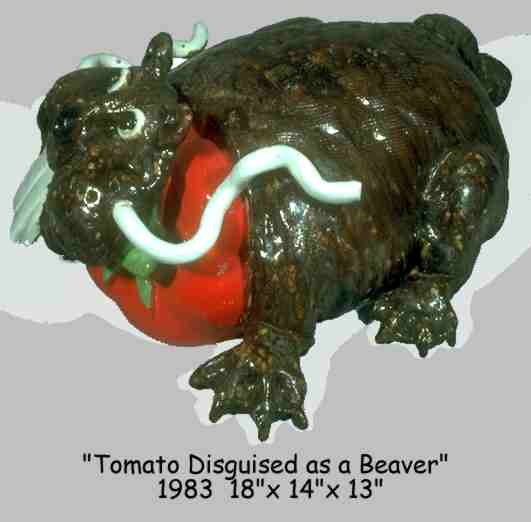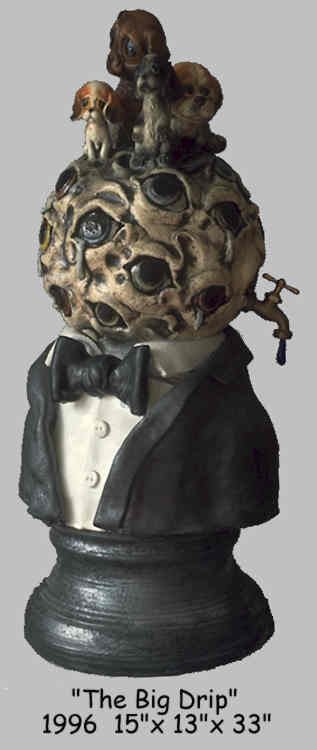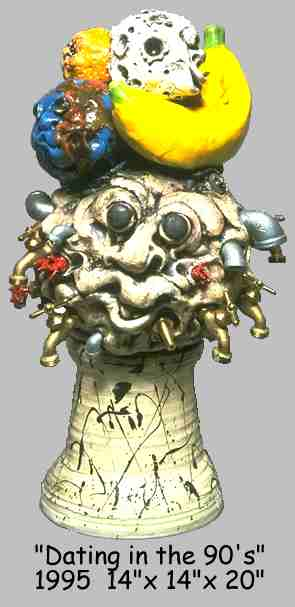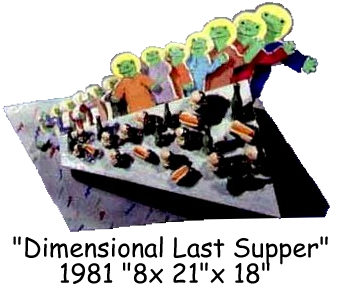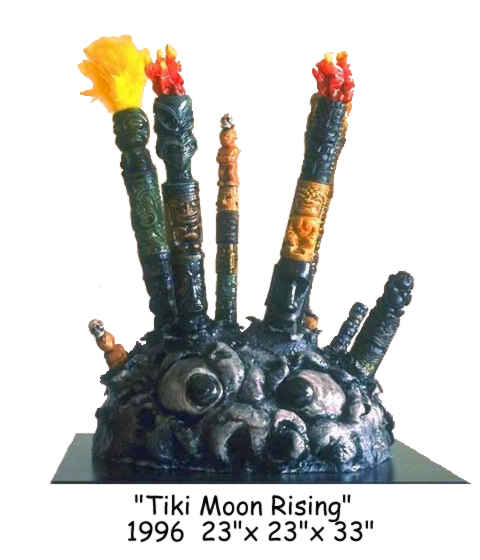Contents
Gallery
Did you come to this site in a frame? Want to get out? Click here!
Click on any image for a larger view. Then click "back" to return to this page.
Planets and More Food
Transitions
The first donuts and pizzas were made by David Gilhooly largely to assuage his appetite while dieting. Donuts and pizzas became his metaphor for being overweight. The later all food pieces, sans frogs, would be extensions of his battle with food.
"I made them (donuts and pizzas) look so luscious that
even I was fooled by them. Upon seeing them, I would get the desire to devour but have it thwarted by the food being clay. It really worked. Only after dealing with the subject of food for many years did I realize that Food itself was becoming sentient, lurking in the background, waiting for us to overstep. Pizzas draped themselves over pianos, orange Jell-O engulfed New York. I fought
back by assimilating myself into the food with pieces like Self-portrait as Sandwich Fixin's or by defrosting my refrigerator."
Diet Dinner, a very large plate with a very small meal in the center was another answer to the problem of overeating, after all it's not what you eat, but how much you eat.
Gilhooly was also battling another problem, the growing dissatisfaction with his work that he could not quite pinpoint. The food pieces served as a respite from making anything with frogs in it as the artist was beginning to suspect his dissatisfaction with his work might also have its origins in the FrogWorld.
But instead of facing that he decided that he was just
tired of 3-dimensions. He tried solving the 3-D problem by rolling out slabs of clay, cutting out the frog figures and setting them on stage-like settings as in Zoo Break! and Frog Last Supper. This method of working largely relied on the glazing of the details on the piece to give the piece its definition rather than giving definition by sculpting the different elements. The artist was soon disabused of this idea because of his attitude toward glazing.
"Glazing was always anti-climactic. Actually, the real creative process is developing the idea, but in order to communicate that idea, it must be made physically and exist in the physical world. The artist has to paint, sculpt, compose, write, etc. and the act of putting this thought into the physical universe is always
inferior to the original thought. The better the artist, the closer the physical piece is to his original thought. That's really all art is, a communication. So, having my idea exist in the physical world as an unglazed piece of work was for me, the end of the creative process. Having to glaze it was a tedious, seemingly unnecessary job."
Inspired by "Crystal Japan" a piece composed by David Bowie for a Japanese sake commercial, the artist bought some clear Plexiglas with the idea of creating a crystal city and some green Plexiglas to create a jungle with. After working with the opaque medium of clay, Gilhooly relished the challenge of a transparent medium that not only reflected light but also diffused it.
Alternating between Plexiglas and clay with occasional departures in wood and print, the artist continued to work on the subject of food and also delved into cityscapes. Soon, the ideas of sentient food and cities merged.
"There were six-foot long Dagwood sandwiches made in clay which I equated with totem poles as in "The Beavers Carve Their Own Totem" or the Transamerica
building in San Francisco. Those three images became confused in my mind. The multiple colors of the different elements of the sandwich and the stacks of figures in the totems translated into multi-colored layers of the Plexiglas Transamericas."
Venus of Willendorf Burger, an homage to grease, Sandwich Arch and the Excessive Sundae assumed skyscraper-like dispositions. Food cascaded down Duchampian staircases in both clay and
Plexiglas. But, the Plexiglas pieces for the most part, floundered and were so unsatisfactory to the artist that he destroyed most of the first attempts. Gradually, Gilhooly realized that it wasn't just the FrogWorld that he was dissatisfied with. It was the medium of clay itself. But the FrogWorld and clay kept harkening.
"People were familiar with the FrogWorld. Galleries could sell FrogWorld artifacts easily. I was known for
my work in ceramics. The money was good and I could pay my bills. I was in danger of getting into the trap of doing my own work over and over again, stealing from myself rather than from other artists. I realized that people had caught up with the idea of the FrogWorld and that I wasn't working 10 years into the future. Good artists really do work 10-20 years in the future. Look at science fiction. That's why a culture with free artists moves forward in time. The artists pull a society into the future whether it wants to go or not. Which isn't to say that an artist should be poor because you can transition in such a way as to overcome bankruptcy as long as you keep going forward in time
with your work."
In an effort to end the FrogWorld, Gilhooly created pieces like Clean Sweep, and FrogFood on the Way to Valhalla. He even went as far as banning FrogFood. The FrogWorld seemed to have a life of its own, to have its own sentience and like food, lurked in the background, waiting... In desperation, Gilhooly sent them into space and to the moon only to have them leave their FrogWorld bodies and take up celestial bodies. The earlier planets still had some of their
Frogomorphic qualities but as the artist got farther and farther away from the FrogWorld the planet pieces also evolved until they became as omnipresent as a Blackhole, a frog that had such presence that he achieved the gravity of a blackhole with the planets being sucked into his head and face.
"I had always liked the idea of working with found
objects, but never felt that I could quite pull it off. I really admired the way other artists like Bruce Conner, William Wiley and Joseph Cornell could take objects and incorporate them into sculpture. It's so direct and immediate. The communication isn't diluted by my having to manufacture each element of a sculpture because it already exists."
Finally the universe having tired of being engulfed by frogs battled back and the planets took on other less
Frogomophic forms. Gilhooly gradually began adding non-clay elements to the planets. While finding his voice in purely Plexiglas sculptures, he created pieces predominantly from clay with Plexiglas details and transitioned from that to ceramic incorporated with found objects. Gilhooly began frequenting thrift stores, Goodwills and garage sales in search of "things". The Plexiglas was becoming more satisfying and he was becoming more facile with the medium's inherent risks. He also found that he could successfully combine found objects and even real food with the Plexiglas. Still it would take until 1996 for the artist to complete his last clay piece, Tiki Moon Rising and the Plexiglas pieces were undergoing a rapid metamorphosis of their own.
"I have always kept a sketch book that had ideas and titles in it as well as sketches. While I didn't feel particularly compelled to finish up all of the ideas in that book, there were some ideas that it contained that I just couldn't waste. Having finished those up and getting really sick of clay and the dirt and the dust in my studio, it was very easy for me to get rid of all the ceramic related equipment and left over glazes without any remorse what so ever."
Last revised May 7, 1999
